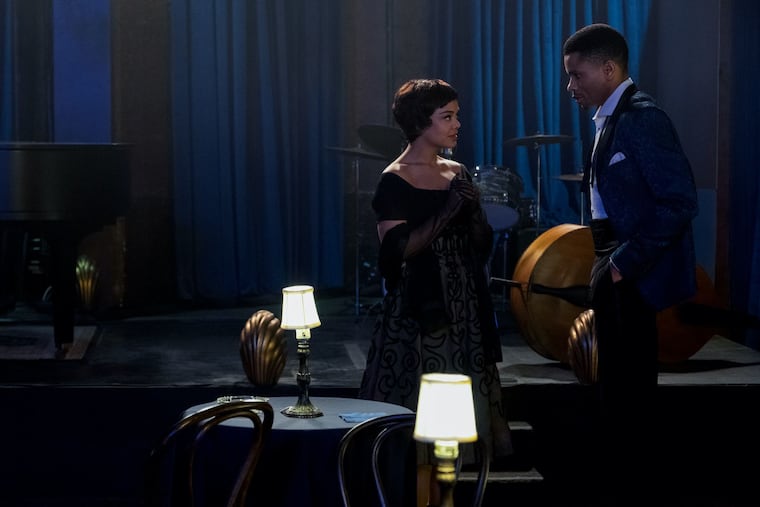Nnamdi Asomugha, former Eagle, is now starring opposite Tessa Thompson in a ‘swoon-worthy’ romance
Asomugha says the discipline of prepping for weekend games came in handy as he learned to play the saxophone for his leading role in the romance, set in the jazz scene of the early 1960s.

The last time Philly saw Nnamdi Asomugha, he was leaving town after a disappointing pair of seasons in 2011 and 2012 as a cornerback with the Eagles, following a star-making run with the Oakland Raiders.
Local audiences now have the chance to see him in less frustrating circumstances as the producer and costar of the new period romance Sylvie’s Love, now streaming on Prime Video. Asomugha plays a rising-star jazz saxophonist in the early 1960s who embarks on an embattled love affair with an aspiring TV producer played by Tessa Thompson. He’s also one of the movie’s producers.
Critics are lavishing the movie with praise as a “swoon-worthy” (Los Angeles Times) return to “the art of the classic Hollywood romance” (The New Yorker).
Asomugha spoke with The Inquirer earlier this month from his home in Los Angeles and couldn’t help getting in a dig about Philly’s wintry weather, even as he professed his continued love for the city.
Greetings from Philadelphia.
How’s Philly right now? Freezing?
It’s on the chilly side. Do you miss it?
I do miss Philly. Philly’s actually one of my favorite cities, along with San Francisco. I think it’s the fact that it’s not as large as New York, but you still have a specific culture. Whether it’s the food or the people, I don’t know, but there’s something about it that’s very historic and cool.
What was it about “Sylvie’s Love” that attracted you to the project?
I think it was the simple fact that it was something that I hadn’t seen before. In anything I do in my life, I’m most attracted to things that are new and fresh, that feel like something different.
I hadn’t seen a love story that took place during this time period and was centered around Black people, but not their societal issues. You can name [plenty of] love story type films that took place during that era — The Notebook, for one — but to have one that centered around people that look like me who were just trying to make their relationship work was pretty interesting.
I never thought that I would do a romantic film, but it had that level of impact on me.
It’s true. Knowing the typical film made about African American characters in this time period, you do watch with a clenched jaw waiting for violence or tragedy to erupt. It was refreshing to see it take a different path.
I hear that so often. There’s a point toward the end where [my character] Robert is leaving. He kisses his lady and kisses the kid and drives off, and people always say they expect something terrible to happen on that drive. That’s not the film we were trying to make.
Just because it’s [set during] the civil rights era, people are expecting there to be some sort of march with water hoses and dogs. Look, Martin and Malcolm had time to get married and fall in love and have kids, too, so why can’t we put a story like that onto the screen?
Hopefully the takeaway for people in the industry is that there’s an audience for a film like this.
You play a gifted jazz saxophonist at an interesting time when the music’s popularity was giving way to rock and R&B. Did you have much connection to jazz prior to making the film?
I didn’t really. My connection [came through] the script and the story. I was so dedicated to this character, I wanted to find out what was so interesting to him about this music.
I watched documentaries like Ken Burns’ Jazz, and I fell in love with the artists: Dexter Gordon, John Coltrane, Sonny Rollins, and the guys today like Joshua Redman and Mark Turner. I just really started to dive in, and it became part of my life. And I learned how to play the saxophone.
Learning the sax, it must have been useful that you were used to discipline and practice from your football days. Are there things like that that you can take from your former life and carry into your acting roles?
Oh, man, without a doubt. That’s one of the biggest crossovers. I had a coach once that said, “The way you do one thing is the way you do everything.”
In football, it was all about studying for me. It got to be such a mental game. The preparation throughout the week needed to be intense so that hopefully on the weekend it was made easier.
That’s been my approach with this film and with acting in general. The process early on has to be so intense so that the moment I’m in it, I can throw it away and just be real and trust that everything I’ve learned is still in there.
Speaking of your football days, how do you look back at your time in Philly with the Eagles?
That was a time where I really, really, really was hopeful that we would win a Super Bowl. You come into a situation like that with dreams and goals and aspirations and what do you do when those things don’t happen?
I was at a point in my career where it was the Super Bowl or nothing. That was such a tricky situation, coming in after a lockout season, and we just never really got the opportunity to really build. That was definitely a tough period.